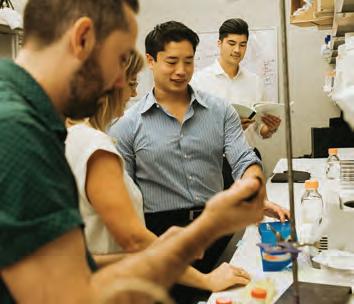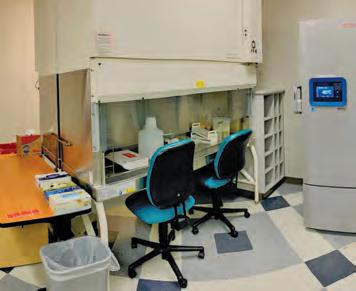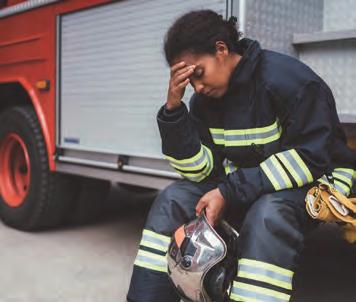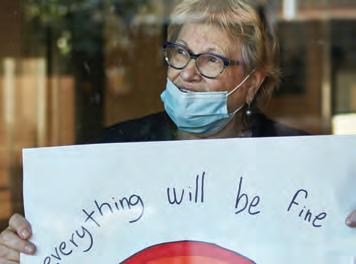
9 minute read
Answering the Call: Louisiana's Response to COVID-19
The disease caused by the novel coronavirus began as “2019nCoV.” In February, the World Health Organization named it “COVID-19.” As the months have passed and the public has grown more and more familiar with it, now it’s just known as “the pandemic.” Call it what you want, SARS-CoV-2 has dramatically altered life for our students, faculty, and patients. And the pandemic itself will likely last for months with after-effects lasting for years.
In times of crisis there are always frontline workers—women and men who take on the responsibility to protect the rest of us. This crisis is no different.
Advertisement
LSU Health is taking the responsibility seriously. We are pivoting to attack the problem head-on, focusing our resources and expertise on the coronavirus pandemic.
Our efforts focus on three areas: testing, research and treatment. The education leaders, teachers, GME leaders and all of their support staff at the School of Medicine have demonstrated remarkable dedication to the missions of the school throughout this troubling time. Researchers have quickly seized the moment to design protocols with experimental medications and convalescent serum, to develop tests, to study COVID pathology and to learn about its pathogenesis.
But none of this is effective without the financial support of the LSU Health Foundation, New Orleans and our network of corporate and individual supporters. To support these critical projects, the Foundation has introduced the Coronavirus Response Effort. Traditional funding sources can be slow and accelerating the financial support for this pandemic is crucial. As you read through our accomplishments to-date and the many more in the works, take a moment to thank those who support the Foundation and please consider adding yourself to the list of contributors. None of this would be possible without them.
TESTING
Establishing The First Next Generation Sequencing Testing Facility
The LSU Health New Orleans School of Medicine Clinical Genomics Laboratory was initially created to support the basic research infrastructure of the medical school. It has since developed into a state-of-the-art facility capable of developing next generation sequencing (NGS) protocols including whole transcriptome, RNASeq, whole exome sequencing and SNP analysis, and transcriptional profiling. At the onset of the COVID-19 pandemic, Dr. Lucio Miele and his team pivoted. They transformed the laboratory into the first-of-its-kind COVID testing facility in Louisiana.
LSU Health New Orleans partnered with Illumina, the manufacturer of the first high-throughput nasopharyngeal, oropharyngeal, and mid-turbinate nasal swab test for COVID-19, to speed up the processing of these amplicon-based NGS tests designed to detect RNA from the SARS-CoV-2 virus in patients with suspected symptoms of COVID-19.
The fast application of the LSU Health facility and the FDA Emergency Use Authorization for the COVIDSeq Test has greatly increased testing numbers and has reduced testing turnaround time. The facility is designed to perform up to 768 tests per day.
The creation of this lab has allowed the School of Medicine to achieve its goal of expanding access and acceptability of COVID-19 testing to underserved communities in New Orleans.
RESEARCH
LSU Health School of Medicine has initiated efforts to better equip researchers to undergo studies to understand and treat COVID-19. Dr. Steve Nelson, Dean of the School of Medicine, has established multiple research programs that begin with the funding of pilot research grants. When these programs are funded, the research will help end this pandemic and may help avoid future epidemics of all sizes.
LEAD COVID-19 Trial

Dr. Frank Lau and his team work on their LEAD COVID-19 Trial research.
In the face of the COVID-19 pandemic, Dr. Frank Lau, Associate Professor of Clinical Surgery, and his team are applying their experience and expertise in the fight. The team quickly recognized that COVID-associated coagulopathy (the official name for excessive clotting in COVID patients) was an important driver of this disease’s morbidity and mortality.
But several questions remained: Why do many patients have no symptoms at all, while others require ICU care? Why do dark-skinned persons, people with high blood pressure, and the elderly get sicker? Why do smokers and homeless patients seem to be protected from symptoms? Why do sick COVID-19 patients form blood clots so aggressively? And why do certain countries, such as those in Scandinavia and Australia/New Zealand have lower mortality rates?
The team considered the risk factors for COVID death: hypertension, obesity, diabetes, age and dark-skinned individuals. An intense search of the medical literature revealed that low vitamin D levels are strongly linked to every COVID-19 risk factor. But which came first?
Were COVID risk factors biomarkers for vitamin D deficiency? Dark-skinned persons produce less vitamin D because they naturally block UV light. Low vitamin D levels can cause high blood pressure. Elderly patients who do not go outside as much can have critically low vitamin D levels. Strikingly, low vitamin D levels can reduce our immune defenses against viral infections like COVID-19 and can also lead to dramatic, whole-body clotting when we get sick. Or could it be that low vitamin D is a bio marker for the COVID risk factors instead?
Enter the scientific method. Researchers tested vitamin D levels in two New Orleans ICUs that were filled with COVID-19 patients. The results were jaw-dropping: 93.5% of COVID-19 patients in the ICU had low vitamin D. Many were nearly undetectable.
The team is determined to see if vitamin D offers mechanistic insights into excessive clotting and if aspirin and vitamin D can spearhead our fight against SARSCoV-2. Financial support is currently being gathered to fund the trial. This is a gold-standard trial that will enroll 1,080 patients across seven participating hospitals around the country.
COVID-19 Research Lab

The Biorepository will not only assist with research for this pandemic but will help us prepare for the next epidemic.
Imagine a library where doctors can check-out materials essential to their research without having to collect new samples from the field. Now imagine these materials are cataloged and cross-referenced with additional genetic data—all available immediately, on demand. Welcome to the COVID Biorepository.
As a response to the COVID-19 crisis, LSU Health School of Medicine has established the COVID Biorepository. Dr. Steve Nelson realized at the outset that LSU Health needed a centralized resource to collect biospecimens from COVID-19 patients as well as uninfected control samples for study. These biosamples include plasma, serum, peripheral blood mononuclear cells, nasal swabs, nasopharyngeal swabs, saliva and stool. The biorepository functions under standard operating procedures (SOPs), quality control for sample collection, and a common database to track consent, samples, and manage requests to dispense biological samples and data.
The establishment of the biorepository is important to foster a broad array of research projects, and will be used not only for acute, but also for longer-term studies and to create an infrastructure to help LSU Health better prepare to respond to the next epidemic or pandemic.
TREATMENT
The MMR Vaccine as a Preventive
Out of the box thinking—that’s one approach our researchers are taking in their efforts to treat COVID. The idea, spearheaded by Paul Fidel, Ph.D. and Michael Hagensee, MD, is to relieve the effects of coronavirus on patients who demonstrate severe symptoms such as progressive lung inflammation. Perhaps, thought Drs. Fidel and Hagensee, treatments similar to those used to fight other viruses might serve to treat the coronavirus.
Most influenza vaccine products are available as trivalent inactivated vaccine (TIV). These vaccine products contain three inactive strains of flu virus, but no live virus. In contrast, there are influenza vaccines that contain live virus that have been attenuated or weakened. Reports from the CDC and the AAP for the use of influenza vaccine do not always state a preference for trivalent inactivated vaccine or live-attenuated influenza vaccine (LAIV) for efficacy. But other successful vaccines such as MMR (measles, mumps, rubella) are exclusively live and attenuated. Our team postulates that a live-attenuated vaccine for an unrelated virus may serve to trigger the body’s response mechanisms, relieving symptoms that mirror those of coronavirus.
Dr. Fidel and Dr. Hagensee are leading the charge to secure funding to study the administration of an unrelated live attenuated vaccine and how it could serve as a preventive measure against the worst conditions of coronavirus. There is mounting evidence that live attenuated vaccines may protect against subsequent lethal infections, such as progressive lung inflammation and eventual sepsis. A clinical trial with MMR in high-risk populations may serve as a “low-risk/ high-reward” preventive measure in saving lives during this unprecedented COVID-19 pandemic.
Mental Health Hotline

First responders and frontline workers are in need of high-quality mental health support.
The overwhelming impact of COVID-19 will affect first responders and frontline health and security personnel for a substantial period of time. By addressing these issues of exposure now, we can successfully mitigate aspects of the pandemic on Louisiana’s emergency workforce, improve job satisfaction and accessibility to others. The LSU Health Department of Psychiatry provides essential training and treatment services through rural and urban parishes and responds to critical needs of the state following catastrophic events. In other words, that’s what we are here for.
First responders are the backbone of rescue and recovery during difficult times. Firefighters, EMTs, and law officers protect the public often at a grave personal cost. Without addressing the extreme impact of COVID-19 and other catastrophic events, we may risk jeopardizing our first responder workforce retention as well as the personal well-being of individual workers. In response to this concern, the LSU Health Department of Psychiatry has created a Mental Health Support Hotline, providing first responders and other crisis support personnel with helpful counseling and behavioral health professional interventions.
A recent survey of over 4,000 first responders reported that many programs provide nominal services rather than high-quality counseling and treatment resources. The Department of Psychiatry has developed a significant response to address the impact of COVID-19 on multiple aspects of the behavioral health of our communities in Louisiana. These high-quality interventions and supports can help address PTSD symptoms, depression, extreme levels of stress, and substance use disorders that have historically affected those on the front lines of a crisis. At LSU Health, we are acting now while looking ahead to protect the health of our staff, our students, our faculty and our patients.
Recovery and Community Resilience Fund
It is part of our mission to protect and advance the well-being of the region and beyond. We aim to make mental health treatment accessible to the residents of New Orleans and southern Louisiana regardless of their social or financial situations.
Dr. Benjamin Springgate, Chief of the Section of Community and Population Medicine in the Department of Medicine, believes that the coronavirus pandemic represents more than a public health crisis. He asserts that COVID-19 is giving rise to a significant mental health crisis. LSU Health is moving to target this growing concern with evidence-based solutions. Funding from a new Recovery and Community Resilience Fund will go to making high-quality treatment accessible to at-risk populations.
As we look forward to life after the pandemic, we understand that these efforts will pay dividends for years to come. We are building a healthcare system that is better prepared to face challenges like hurricanes or pandemics in the future for our patients, our students, faculty and everyone in our community to live a healthy life.











